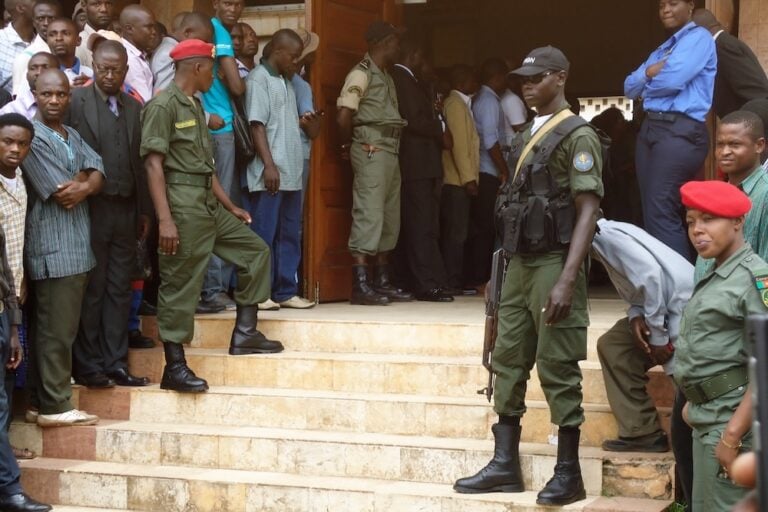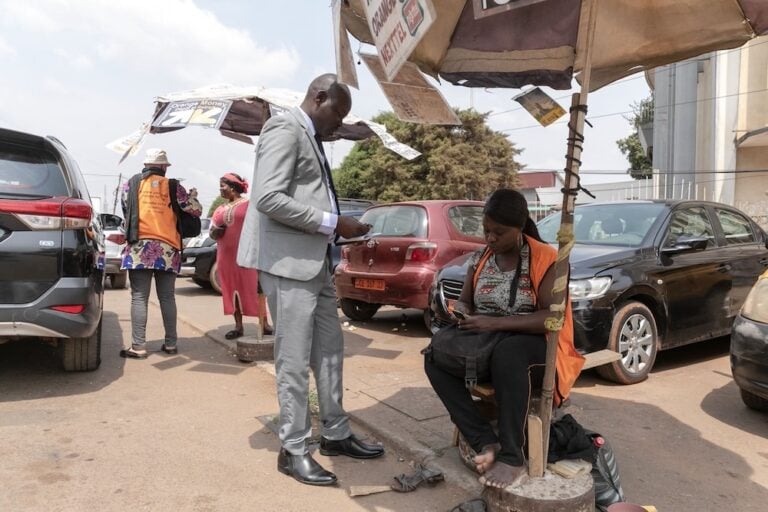In a wave of censorship, Cameroon has indefinitely banned two TV programs for what regulators considered violent content and another three radio programs on vague charges of ethics violations, according to news reports.
In a wave of censorship, Cameroon has indefinitely banned two TV programs for what regulators considered violent content and another three radio programs on vague charges of ethics violations, according to news reports. The Committee to Protect Journalists condemns the move, which also includes the suspension of at least seven journalists.
“These programs put a spotlight on the serious problems affecting Cameroonian citizens, including crime, injustice, and corruption. The government has tried to disguise its actions as a matter of ethics, but everyone can see it for the censorship that it is,” said CPJ Africa Advocacy Coordinator Mohamed Keita. “We call on authorities to drop these censorship orders immediately and to halt their continuing campaign to silence critical news and opinion.”
The National Communications Council announced the censorship orders via a press statement on Thursday. Representatives with the programs and the journalists said they would appeal the ban. They have 10 days to present their case to the council.
The council accused the TV programs of showing extensive segments of “violent and indecent images,” which it said violated government regulations. The stations had aired programs in March that focused on gruesome murders in the country, according to news reports.
The council banned “Canal 2tective,” a monthly investigative program on independent broadcaster Canal 2 International, and suspended its presenter, Ruben Malick Djoumbissié, from broadcasting for three months. The program had probed the discovery in recent months of the mutilated corpses of young girls found in Yaoundé, the capital, and had raised questions about the possibility of ritual killings and trafficking of organs. The program featured interviews with the parents of the victims, as well as neighborhood residents and experts, and discussed the inability of the authorities to end the crime spree, according to footage reviewed by CPJ.
The council also banned the weekly “IPP News” on the private broadcaster LTM TV, and suspended its presenter, Josh Zela Amadou, better known as Awilo, from broadcasting for six months. The station had dispatched a cameraman to report on the discovery of a headless body on the street, according to local journalists. Awilo told CPJ the images had also been shown by other broadcasters which did not face repercussions.
In its orders banning the radio stations, the council did not offer specific reasons, but cited general violation of what it described as ethics violations.
The council banned Youth FM’s “Déballage” program, and suspended presenter Duval Ebalè from broadcasting for six months, according to news reports. Ebalè told CPJ he was seeking a meeting to obtain specifics about the reason for the ban. He said the ban could be linked to the program’s recent coverage of allegations of financial irregularities surrounding a water project between the Cameroonian government and a Canadian company.
Regulators also banned Amplitude FM’s “La Voix des sans Voix” (Voice of the Voiceless) program and suspended three journalists–presenter Jean Jacques Ola Bebe, reporter Aimé Césaire Zambo, and producer Claude Yong–for three months. The program acted as a platform for local citizens to air personal complaints, including marriage disputes and complaints about the police. Bebe told CPJ the council did not say what ethics or rules the station had violated.
The council banned Sky FM‘s “Surface de Vérité” program, and presenter Hervé Mfoula was suspended from broadcasting for three months. Mfoula told CPJ the program had not received any prior warning. He said the program often mediated personal complaints, most of which were resolved off the air. Joseph Olinga, the station’s manager, told CPJ that the council had issued a letter to the station in May 2012 in which it had praised the staff’s work.
Jean Tobi Hond, the council’s secretary-general, told CPJ he couldn’t comment on the details of the case, but that the council had evidence to support its actions. He said the broadcasters had the right to appeal.
The council, whose members are all picked by President Paul Biya, was granted broad new regulatory authority to sanction or ban news outlets in January 2012 by a presidential decree. Biya had created the council in 1991 as a consultative body attached to the office of the Prime Minister to assist the government in implementing and monitoring communications policy.


